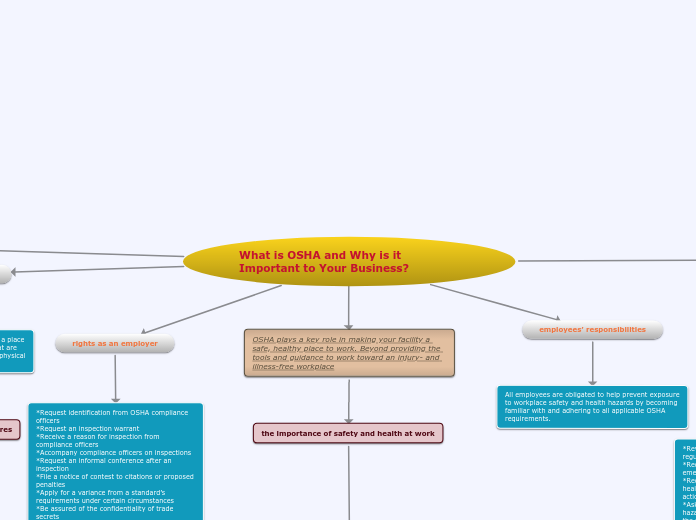What is OSHA and Why is it Important to Your Business?
employees’ rights
*Review employer-provided OSHA standards, regulations and requirements
*Request information from the employer on emergency procedures
*Receive adequate, OSHA-required safety and health training on toxic substances and emergency action plan(s)
*Ask the OSHA area director to investigate hazardous conditions or violations of standards in the workplace
*Have his or her name withheld from the employer when filing a complaint with OSHA
*Know what actions OSHA took as a result of the employee’s complaint and have an informal review of any decision not to inspect or issue a citation
*Have an employee representative accompany the OSHA compliance officer on inspections
*Observe monitoring and measuring of toxic substances or harmful physical agents and review related records (including medical records)
*Review the Log of Work-Related Injuries and Illnesses (OSHA 300 Form), if applicable, at a reasonable time
*Request a closing discussion following an inspection
*Object a citations’ set abatement period
*Seek safe and healthful working conditions without your employer retaliation
employees’ responsibilities
All employees are obligated to help prevent exposure to workplace safety and health hazards by becoming familiar with and adhering to all applicable OSHA requirements.
rights as an employer
*Request identification from OSHA compliance officers
*Request an inspection warrant
*Receive a reason for inspection from compliance officers
*Accompany compliance officers on inspections
*Request an informal conference after an inspection
*File a notice of contest to citations or proposed penalties
*Apply for a variance from a standard’s requirements under certain circumstances
*Be assured of the confidentiality of trade secrets
*Submit a written request to the National Institute for Occupational Safety and Health (NIOSH) for information on potentially toxic substances in your workplace
responsibilities as an employer
you must provide your employees with jobs and a place of employment free from recognized hazards that are causing, or are likely to cause, death or serious physical harm.
rules and regulations that osha requires
*Provide well-maintained tools and equipment, including appropriate personal protective equipment (PPE)
*Provide medical assistance and guidance for employees sustaining workplace injuries/illnesses
*Provide required OSHA training
*Report accidents that result in fatalities to OSHA within eight hours
*Report accidents that result in the hospitalization of three or more employees to OSHA within eight hours
*Keep records of work-related accidents, injuries, illnesses and their causes
*Post annual injury/illness summaries for the required period of time
How does OSHA contribute to job safety and health?
The primary goal of the Occupational Safety and Health Administration (OSHA) is to carry out the Occupational Safety and Health Act (OSH Act), which Congress originally passed in 1970. The OSH Act has undergone several amendments and revisions since its inception Title 29 of the Code of Federal Regulations (CF), Parts 1902 – 1990, houses all the OSHA standards This ensures a minimum standard of job safety and health that all employers must follow to protect employees.
Are all employees covered by the OSH Act?
covers all employees except public employees in state and local governments and those who are self-employed.
OSHA plays a key role in making your facility a safe, healthy place to work. Beyond providing the tools and guidance to work toward an injury- and illness-free workplace
the importance of safety and health at work
Effective job safety and health programs not only help reduce worker injuries and illnesses, they save employers money in the long run.









